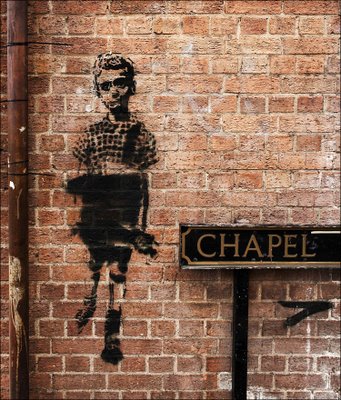
(Picture above courtesy topleftpixel.com)
May 1 , 2006 I try to avoid the term "peak oil" because it has cultish overtones, and this is a serious socioeconomic issue, not a belief system. But it seems to me that what we are seeing now in financial and commodity markets, and in the greater economic system itself, is exactly what we ought to expect of peak oil conditions: peak activity.
After all, peak is the point where the world is producing the most oil it will ever produce, even while it is also the inflection point where big trouble is apt to begin. And this massive quantity of oil induces a massive amount of work, land development, industrial activity, commercial production, and motor transport. So we shouldn't be surprised that there is a lot happening, that houses and highways are still being built, that TVs are pouring out of the Chinese factories, commuters are still whizzing around the DC Beltway, that obese children still have plenty of microwavable melted cheese pockets to zap for their exhausting sessions with Grand Theft Auto.
But in the peak oil situation the world is like a banquet just before the tablecloth is pulled out from under it. There is plenty on the table, but it is about to be overturned, spilled, lost, and broken. There's more oil available then ever before, but also so many people at the banquet table clamoring for it that there is barely enough to go around, and the people may knock some things over trying to get it.
A correspondent in Texas writes: "On a four week running average basis, total US petroleum imports (crude + products) have been falling since 2/24/06, until last week, when we finally showed an increase of 1.3 percent, after bidding the price of oil up by about 20 percent. IMO, we bid the price up enough to (temporarily) increase our imports. We will see what subsequent weeks show, but I think that we are in the early stages of a bidding war for remaining net export capacity. The interesting question is what countries may not be importing because they can't afford the oil." A substantial amount of total house sales are made up of new suburban McHouses built in places at the furthest extreme distance from employment centers -- because that's where the remaining cheap land is after sixty-odd years of suburban development. How many prospective house-buyers will close on those things with gasoline over $3 a gallon?
Probably fewer than are required to sell them all. And more McHouses will be coming on the market in any case because they are products of a planning and permitting process that takes years for things to finally get built. Once the house-selling racket, and its associated mortgage racket, stop grinding along, the machinery of the US economy has to seize up. The financial sector, which used to be an appendage of the economy, but has become an end in itself, has to implode when the stream of rebundled securitized mortgage debt stops flowing into it.
When tablecloths are pulled out from under banquet tables, it is hard to say how the platters, bowls, and ewers will tumble and fall, but we can bet that few if any of them will land right-side up, unspilled. One also has to wonder how the other people at the table are going to behave when things come tumbling down.
Mr Kunstler has a way of painting reality in a way that is both dispassionate, and unemotional, but alarming. How in the world can one begin to justify buying a house, or a car, or starting a family, when the banquet is about to end, and people are about to become pigs as they grab what they can? What else can we do, except watch the wave rise? I suppose we can invest in bicycles, growing a piece of land, and cultivating good relationships with our neighbours. We'll need to take each other in when the neighborhoods start going up in flames? Am I being drammatic? Perhaps it is still too soon to be. Last night's power failure reminds one of how vulnerable we are, and how we have all been lulled into a false sense of security. I am certain that the Great Awakening, when it comes, will be rude.
1 comment:
Nice pic! The stencil you see is from one of Diane Arbus' famous photographs, 'Child with toy hand grenade'. Check out the real thing on www.agallery.com/Pages/photographers/arbus.html
Post a Comment